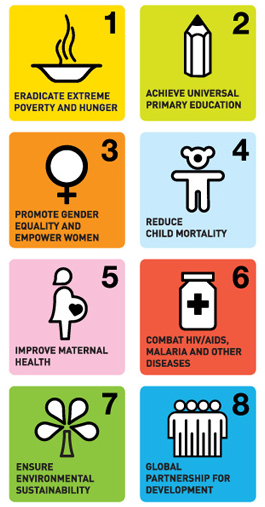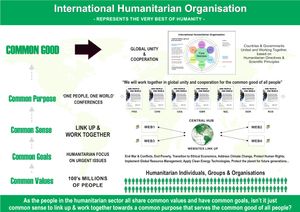A Collaborative Global Effort: “One World One People”
With the onset of greater global communication and ease of transportation around the world, the number of humanitarian efforts has grown exponentially in the past few decades. Engineering, healthcare, and science fields have especially been driving contenders in a common goal for global development around the world. The breadth and speed of such international aid has been made a priority by both major government and NGO institutions. For example, the United Nations Development Program, established in 1965 by UN’s General Assembly, is an effort to take a stand on global improvement for all who need it. With affiliations in over 150 countries, they have formed a network of programs to improve people’s quality of life in underdeveloped countries and have established “Millennium Development Goals” in order to track progress. Indeed, there have been a plethora of organizations established to provide humanitarian needs in an effort to improve people’s quotidian lifestyle – i.e: Engineering Without Borders, established in the United States in 2001.
 Global development efforts can be approached in a multitude of ways, as they impact every aspect of a community’s social life. It may come in the form of education, foreign monetary aid, poverty reduction efforts, implementation of projects, infrastructure, or ensuring human equality. Currently, the efforts for global change and improvement have had an astounding impact in bringing help to millions of people in impoverished communities. Spearheaded by the UN’s eight Millennium announcement, announced in 2000, are goals that researchers and other humanitarian workers will strive to achieve by 2020. These marked one of the first comprehensive and holistic programs for becoming aware and acting upon the issues around the world.
Global development efforts can be approached in a multitude of ways, as they impact every aspect of a community’s social life. It may come in the form of education, foreign monetary aid, poverty reduction efforts, implementation of projects, infrastructure, or ensuring human equality. Currently, the efforts for global change and improvement have had an astounding impact in bringing help to millions of people in impoverished communities. Spearheaded by the UN’s eight Millennium announcement, announced in 2000, are goals that researchers and other humanitarian workers will strive to achieve by 2020. These marked one of the first comprehensive and holistic programs for becoming aware and acting upon the issues around the world.
The Boston University EWB chapter has assisted in spreading awareness for global change by contributing to the effort for improving communities in developing countries. Our Yagi Cell Signal Amplification project, aimed at expediting the retrieval of blood test results to mothers, and water sanitation project are both part of UN’s eight Millennium goals, as we are working towards making a direct impact within our partner community of Naluja, Zambia. When in great numbers, this local approach to global development can have a significant influence on a region. The spread of knowledge can make communities self-dependent and educated enough to implement sustainable projects in surrounding areas. Also, the personal contact that comes with a local partnership enables close progress of development and confidence that improvements are being made through monitoring efforts.
The culmination of many developmental efforts within a country has the potential to have an even more significant impact on social change. Efforts for global aid, such as infrastructure and implementation of necessary solutions for improved health, form a stage for further progress in the country’s other sectors. In a more holistic view of global development, domestic progress can enable economic security and political stability to take form. These are essential attributes for maintaining a resourceful public sector, while enabling the growth of private business for diversification of the economy and a growing workforce. Furthermore, once infrastructural development has been achieved, the issue of human rights and equality can become a central focus in order to ensure flourishing relations among people. Ideally, with such development, a country will be able to join the globalization of the past few decades in order to contribute and benefit from a more unified and collaborative global effort.
Assessing contributions that have already been made to the common goal for global change makes us realize the incessant need for more change and ethical issue of humanitarian goodness through collaboration. The waves of financial crisis coupled with major natural disasters have had an impact on the rate of development. However, the growing innovations in technology and healthcare have led to the development of simple, sophisticated, and sustainable solutions that can have a significant impact on future development. As stated by One World One People, an initiative to unite efforts for global change, “when humanitarian Individuals, Groups and Organizations link-up and combine their numbers and strengths – they will all succeed!” This embodies the social responsibility each of us must take upon ourselves in order to evolve humanity as a whole and ensure further exponential growth in the developing world.
